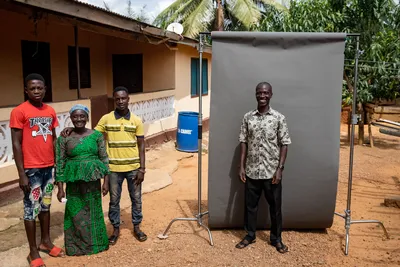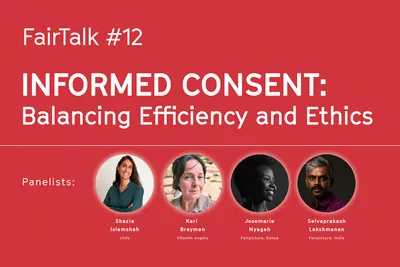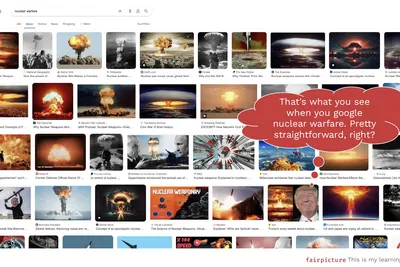Ethical Visual Storytelling Training
Register for our online workshops
We offer regular workshops featuring co-learning sessions led by recognised experts on key topics in ethical storytelling.
Book your spot in an upcoming session below.
We also provide tailored training and consulting sessions to meet the specific needs of your organisation. Together, we build awareness and develop the skills needed to create compelling, creative, and fair communication with confidence.
Online Workshops Calendar
AI-generated images are increasingly significant in our work, raising questions about their appropriate use. How do we responsibly integrate these advancements without entirely rejecting them? A framework is needed to address structural discrimination in image prompting. This course offers tools for critical reflection on AI images and guidance on ethical image prompting. The participants will get a sense of the inner workings of current image generators - how they think and how were they trained.
We’ll also explore the public reactions to AI imagery, its evolving perception, and how to mark manipulated images. The course compares differnt AI models, from proprietary models from Adobe, Midjourney and OpenAI to open-source alternatives like Stable Diffusion, examining their ethical considerations and the impact of unknown training data.
Trainer: Karpi
Next date: January 20th 2025, 1:30 PM - 5:00 PM CET
Registration is open - Sign up now
One person’s stereotype might be another one’s experience. It is often difficult to judge whether an image reflects a stereotype or the reality of life. For fundraisers and communication officers in development organisations, this is a particular challenge, especially in their relations with donors or the public. How can stereotypical representations be avoided and why is this important for visual communication? This workshop provides basic knowledge on understanding and recognising stereotypes, and gives participants tools to avoid falling into most common traps. Approaches towards inclusive, diverse visual language will inspire participants to develop new stories and find new possibilities for their ethical visual communication.
Trainer: Mag.a Dr.a Miša Krenčeyová
Next date: tba
Poverty, deprivation, suffering: they are real, and projects working for change require funding. And fundraising is a tough and competitive business. But: does fundraising really need to rely on stereotypical images of poor and deprived people? How can visual communication in campaigns and donation letters be more fair - to those depicted and those viewing the images? Align your visuals with your values. Strengthen the ethical substance of your fundraising campaigns to make them both: persuasive and ethical.
Trainers: Mag.a Dr.a Miša Krenčeyová and lic. phil. Jörg Arnold
Next date: tba
In communication and fundraising, most aid organisations are faced with the challenge of portraying aid recipients in a dignified way even in difficult situations. But portraying poverty and suffering without exploiting the pain of the people depicted is a tightrope walk. Accusations of «Poverty Porn» as an emotionalising form of communication weigh heavily. How can the dignity of people in the pictures be preserved? This workshop will show you problems and ways of handling them. It will enable you to better understand current debates on «Poverty Porn», sharpen your own position and draw on approaches for solution-based, balanced visual communication.
Trainer: Mag.a Dr.a Miša Krenčeyová
Next date: tba
Children are the most depicted subjects in humanitarian and aid-related communication. Showing children in need arouses a strong emotional reaction in the viewer - yet might be prone to exploitation. Portraying children requires careful navigation to ensure their dignity is upheld and their rights remain respected. Join us in exploring ethical approaches to depicting children in difficult circumstances. This training equips participants with strategies to navigate the challenges of portraying children sensitively, avoiding exploitation, and contributing to respectful communication practices.
Trainer: Mag.a Dr.a Miša Krenčeyová
Next date: tba
It was great to connect with likeminded practitioners in this workshop around ethics in communication. The specific examples were really helpful and the discussion inspiring.
Workshop participant
Latest blog posts
Our community's inspiring voices

October 2024 -
Co-Creation in Content Production
This series of downloadable articles by Ibex and Fairpicture aims to provide valuable insights into how co-creative storytelling can bring about genuine representation by shifting narratives from being told about communities to being told with them.
Learn more about Co-Creation in Content Production

October 2024 -
Informed Consent: Balancing Efficiency and Ethics
Informed consent is a cornerstone of ethical storytelling, but how do we make it efficient without sacrificing integrity? This was the core question we discussed in our 12th edition of FairTalk.
Learn more about Informed Consent: Balancing Efficiency and Ethics

July 2024 - Noah Arnold
Deconstructing Nuclear Weapons Stereotypes: The Intersection of Journalism and Ethics
The Fairpicture lens on representation and stereotypes is relevant in many fields. See how we challenge the depiction of nuclear weapons, exploring ethical journalism and societal impact.
Learn more about Deconstructing Nuclear Weapons Stereotypes: The Intersection of Journalism and Ethics